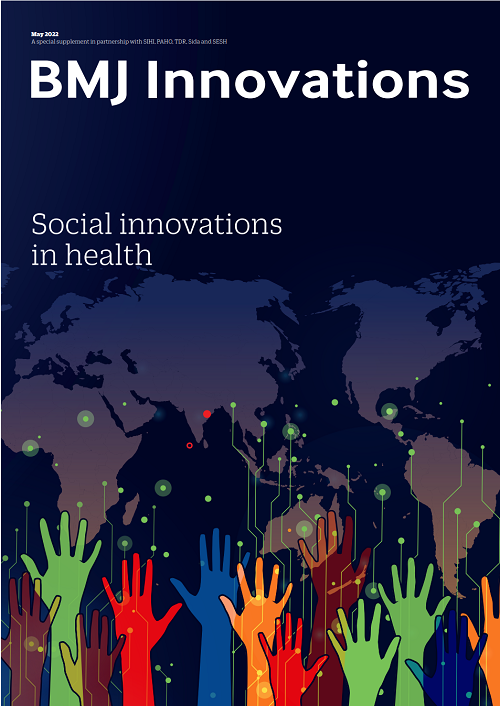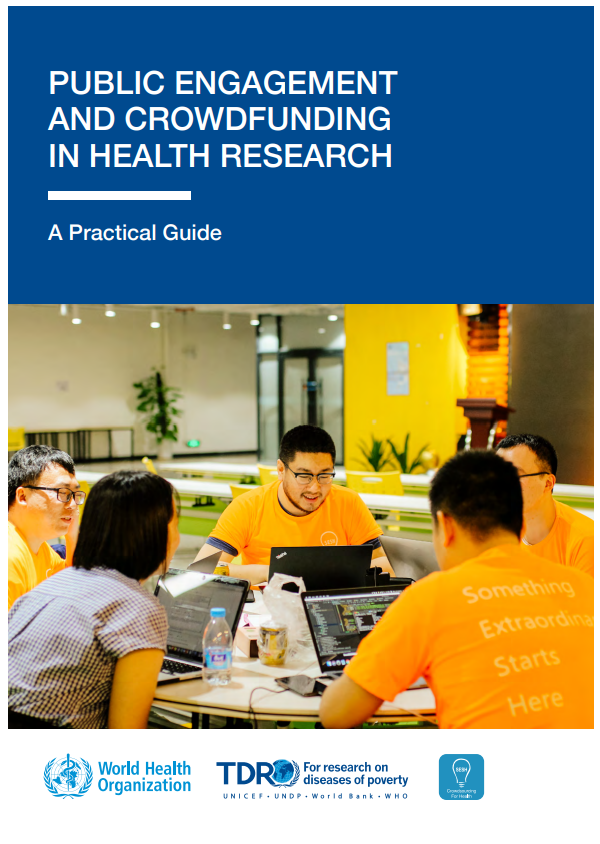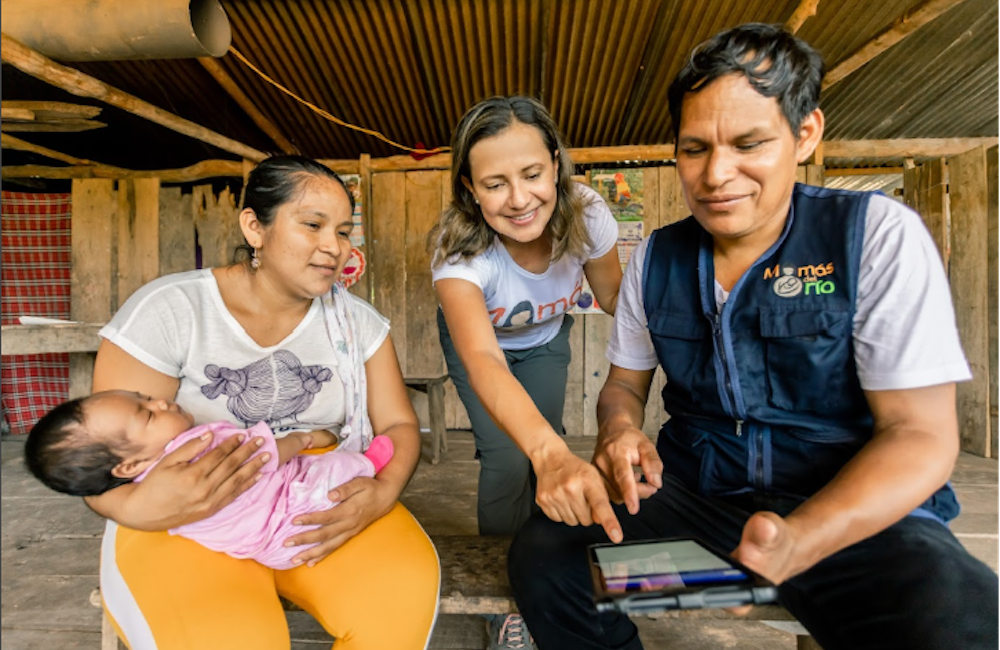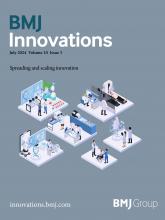
BMJ Innovations special supplement on social innovations for health
“The purpose of this special supplement is to spur the development and maturation of social innovation in health as an academic field and to broaden multidisciplinary collaboration to this end. Here, contributors describe and analyse the history, concepts, tensions and research evidence of community-engaged social innovations and related person-centred approaches.
The overarching goal is to better understand how social innovations can be embedded in health education, training, research, policy, programmes and systems.
Ultimately, the special supplement will demonstrate how social innovation contributes toward a holistic approach to health and development.”
Joseph Tucker, MD, PhD
Professor of Medicine, Harvard University & London School of Hygiene and Tropical Medicine

BMJ Innovations’ special supplement on social innovations for health highlights some of the most important research work, concepts, and practices in social innovations in health. It also showcases the best available case examples of significant improvements in health outcomes.
Participatory health research and action: a practical guide on designations
A designathon is a three-stage participatory activity informed by design thinking that includes preparation with end-users, an intensive period of collaboration, and follow-up activities for implementation and research.
This guide provides practical strategies for people interested in organising a designathon to enhance health and wellbeing. In partnership with the Special Programme for Research and Training in Tropical Diseases (TDR), a systematic review of the literature on designathons for health and a global crowdsourcing open call were organised. Designathons have been used to develop health interventions and social innovations, inform consensus processes, and spur community engagement.
Spotlight on Crowdfunding for health research: A global systematic review, qualitative evidence synthesis and TDR pilot for LMIC researchers
This article analyses a global youth crowdsourcing initiative aimed at enhancing social innovation in health within low- and middle-income countries. The WHO reference this research output in its practical guide on public engagement and crowdfunding in health research, indicating its relevance and impact on health policy discussions.
Helping to influence health policy in Peru
Dr Magaly Blas, MD, MPH, PhD, a medical epidemiologist and programme director of Mamás del Río at Cayetano Heredia Peruvian University, emphasises the importance of sharing her team’s experiences during the pandemic through publications in reputable journals like BMJ Innovations. Mamás del Río focuses on improving maternal and newborn health in remote indigenous communities along the Amazon River.
The pandemic severely disrupted health services, particularly in rural areas. To bridge this gap, Mamás del Río employs social innovations that empower community health workers with mobile technology, ensuring better patient outcomes. This social innovations special collection published by BMJ Group highlights the programme’s success in adapting to communication challenges during lockdowns, showcasing how local solutions can effectively address healthcare needs.
Since the publication of building the social innovation for health ecosystem in Latin America: experiences and learning from SIHI-LAC, the programme has expanded, and the Peruvian Health Minister implemented policy changes to integrate Mamás del Río into the national health system. This initiative enhances community health worker capacity and improves maternal and neonatal care in underserved regions.
Dr. Blas believes that research published in respected journals lends credibility to their work, ultimately influencing government policy for better health outcomes in Amazonian communities.
Mamás del Río initially started its pilot in 13 communities in the Loreto District in Peru and has since grown to include 84 communities located along 350 kilometres of river in the Amazon. A three-year programme evaluation found that the project improved almost all essential newborn care outcomes, specifically those related to thermal care, cord care, and breastfeeding. In addition, Mamás del Río increased hospital delivery.
In 2020, with the support of the Ministries of External Affairs of Peru and Colombia and the Inter-American Development Bank, the project was replicated as Mamas de la Frontera – expanding the programme along the border of Peru and Colombia in 30 communities. In 2023, further funding was secured to expand the project to 45 communities along the border for a further two years. In addition, the community health workers will provide care to children until one year of age, promoting vaccination, anemia prevention, and parenting without violence. CHW will also promote contraception and the prevention of violence against women.

“We found in BMJ a voice to report on what was happening to us during the pandemic to the international world. Having our research published in an important journal like BMJ Innovations shows evidence that our intervention is backed up by research. It also outlines the effect of what we are doing to improve the health of people in rural, remote and indigenous areas.”
Dr Magaly Blas
Professor and researcher, Cayetano Heredia Peruvian University, Peru
Launch webinar recordings
For the supplement launch, BMJ Group facilitated a webinar to show how social innovations can positively affect health and social outcomes, drive more resilient health systems, engage communities, and help achieve universal health.
The event was held in English with simultaneous interpretations in Spanish, French, and Portuguese.
About BMJ Innovations
Research on emerging digital health, medical devices, and innovations. This peer-reviewed online journal is focused on novel technologies, emerging digital health, and pioneering medical devices. The journal champions high-quality original research, systemic and narrative reviews, and early-stage innovation reports designed to accelerate transferable lessons from new health solutions.
Along with a rich mix of news, discussion, and debate, BMJ Innovations helps innovators, clinicians, leaders, and policy makers stay informed and empowered to adopt the latest innovations that will have the biggest impact on health.
The journal focuses on three broad areas of innovation:
- Digital health
- Medical devices
- Novel technologies
This special supplement is kindly supported by the Social Innovation in Health Initiative (SIHI), BMJ Innovations and other BMJ journals. It is also supported by TDR, the Special Programme for Research and Training in Tropical Diseases, and Pan American Health Organization (PAHO/WHO). The call for submissions was in partnership with the Social Innovation in Health Initiative and Social Entrepreneurship to Spur Health. It was co-sponsored by UNICEF, UNDP, the World Bank and the World Health Organization. TDR received additional funding from the Swedish International Development Cooperation Agency (Sida), to support SIHI.
Without these valuable contributions, the production of this important supplement would not have been possible. We thank all those involved.











